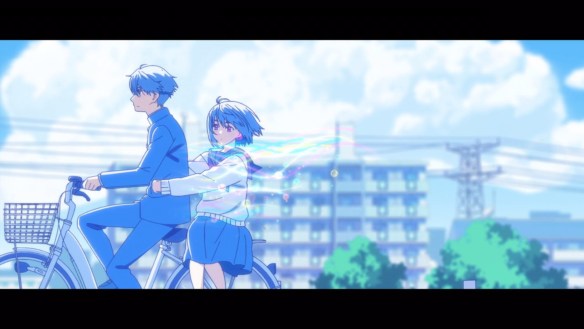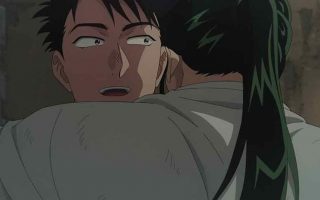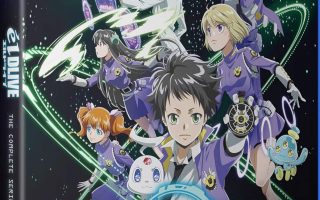Hello folks, and welcome back to Wrong Every Time. Today I’m delighted to announce we are returning to Shoushimin Series, as Osanai and Jogoro continue their seemingly hopeless crusade to become normal human beings. It’s been a tough road for both of them so far, replete with backsliding and compromises, but I imagine they’re pretty used to that. After all, what they are attempting is nothing short of rejecting and replacing their own personalities, the passions that animate them and the natural talents that make them special.
So yeah, probably a bad call on the whole. But as I’ve said before, their feelings are understandable – they are weirdos who prompt friction wherever they go, uninterested in social niceties and so motivated by their off-kilter ideals that they tend to make enemies by accident (and that’s when they’re not intentionally making enemies). They belong in a smoke-filled room pouring over crime scene photos, but instead they are stuck in high school, forced to play nice with kids who seem like different organisms entirely. Adolescence is a process of defining yourself in a social context, and when you receive only negative signals from your surroundings, you’re liable to think that you are the problem. But it is a tragic, regrettable thing to abandon your reason for being, and I can only hope they’re reconsidering this whole self-lobotomy process. Let’s find out!
Episode 6
Ah, this all-timer OP. The best OPs all prime their audience for the story ahead in some way, either embodying the show’s intended tone or playing counterpoint in some way, augmenting that tone with an appropriate companion. This one is definitely the second – while the series itself is reserved and even occasionally menacing, the OP is profoundly optimistic, embodying the hope that these characters rise above their self-recrimination and learn to embrace their true selves. The OP is essentially echoing our own audience perspective, our faith in these leads
Alongside the song, the use of light is crucial for this effect. At least half the images offer some impression of a new dawn breaking, a change in light ushering in a change in perspective
“My Only Charlotte”
We drop in at what appears to be a summer festival, a succession of pillow shots establishing the atmosphere through cuts to yakisoba, candy apples, and grilled corn. It’s easy enough to use a single shot to visually establish a certain environment, but if you want the audience to feel that environment, a collection of incidental sensory details like this is a great way to do it. Engage more senses than just the eyes; with the sizzle of this yakisoba and gleam of these apples, we can hear and taste the festival as well
“You kick too hard.” “I’m not used to wearing geta sandals. I couldn’t fling it how I wanted.” Jogoro and Osanai have such a natural rapport. One of those pairs who don’t really need any external prompt to just riff comfortably
“I take it there’s someone ahead that you don’t want to meet.” Jogoro has learned to instantly translate Osanai’s odd requests or body language into actionable data. You can see why their relationship is important to her; she has difficulty expressing herself directly, but also hates being misunderstood, which naturally creates a lot of friction with others. Little surprise she mostly just holds back from socializing, preferring to use Jogoro as a translator if possible
The festival setting facilitates more imaginative flourishes of framing, like our leads in matching fox masks, isolated against the shrine steps, lit up in their respectively hot and cool tones. I really appreciate these interludes; not every sequence in a drama needs to make physical sense, they can also just make emotional sense, or be included purely because their beauty adds something meaningful to the whole. Once you’ve got a firm handle on the structural fundamentals necessary to maintain the audience’s investment, there’s a lot of room to experiment with storytelling that largely gets ignored in favor of blunt realism
In general, I think “that’s not realistic” is a pretty useless criticism, at least until it’s framed in terms of what “realism” means for a given production. If you’re not betraying a load-bearing source of tension, you can get a lot more fanciful than most directors are willing to (which, to be fair, is partially a result of audiences being primed by Cinema Sins-style anti-art criticism)
True look of shock and despair from Osanai as she realizes she forgot the cotton candy
Summer’s arrival is of course heralded with cicadas and saturated lighting
More comfortable riffing on the other foot this time, as Jogoro outright closes the door in response to Osanai dramatically announcing her “Osanai Sweets Selection: Summer” plan. They are crucially very comfortable setting each other up; even their jokes reflect the equality of their relationship, as they’ll trade off being the punchline
Another flourish of location-hopping as Osanai’s question of “you won’t accept it” is complimented by them bouncing around the summer scenery. This one actually serves a pretty clear symbolic role, illustrating the larger point of Osanai asking Jogoro to engage more with the world, to embrace this distinct summer atmosphere while it lasts. While Jogoro is more comfortable talking to people than Osanai, Osanai is the one who takes initiative in terms of embracing life’s opportunities, and drags Jogoro along behind her
“It would really help to have someone like you to complete my plans for the summer.” Osanai is always scheming, and that’s clearly something Jogoro likes about her – he’s always looking for mysteries to solve, and Osanai’s every third line betrays a hidden intent to uncover
The layout instantly informs us of Jogoro’s mental state the next day; with the sun directly in frame and sweat dripping down his cheek, he’s already regretting agreeing to this outing
Goddamnit, Osanai. The next day she texts him and says she can’t leave the house, meaning she’s basically hired him as a cake chauffeur
“My Only Charlotte” of course refers to the Charlotte cakes. The shop is apparently short by one relative to Osanai’s request
Osanai’s home is quite austere; it’s all done up in black or white, and there are few personal artifacts lining the walls. It frankly looks more like a model than a home that is actually lived in
Osanai leaves Jogoro alone to take a call, and he eventually caves and starts eating one of the Charlottes without her. In spite of his repeated insistence on not being a sweets guy, he is clearly dazzled by this cake
This is actually the most emotion we’ve seen from him! Some excellent, efficient character acting – not too many drawings, but each one is very expressive
They’re really nailing that lazy summer day atmosphere with this episode’s languorous pacing, frequent long shots, and generally minimal sound design. It actually reminds me of Haruhi’s Endless Eight arc, which was similarly dedicated almost solely to establishing an idle summer tone
Oh my god. And now the active drama is Jogoro essentially attempting to cover up his “crime,” which we of course know Osanai would outright kill him for
Love him just staring accusatorily at the cake box, willing it to provide a solution
Effective use of the clock in the background here, making sure it’s prominent in the composition to emphasize the urgency of the situation
Charmed by how into this he’s getting. With no one around to perform normalcy for, he’s embracing the ostentatious performance of a criminal mastermind
Ooh, nice idea – he conceals the murder weapon by actually stabbing it into the second Charlotte, which he would presumably have gotten anyway if there were only two total, thus answering any questions as to why it’s already covered in Charlotte fragments
Oh my god, he is such a bad liar. Just a look of utter shock at Osanai’s “what did you do while you were waiting,” as if he couldn’t possibly have predicted this question. He is far better at revealing things than concealing them
We’re basically doing Hitchcock’s Rope, but with a cake instead of a dead body. Love the intensity with which Jogoro reflects on the napkin situation, which could threaten to undo his entire nefarious plot
They cut the dialogue entirely as Jogoro continues to make small talk, further emphasizing how this is all just misdirection as he attempts to resolve the lingering napkin issue
“I’m glad you liked them so much.” The character acting continues to impress, with clear menace apparent behind Osanai’s smile. It’s the sort of heavy-lidded smile that conveys a sense of a cat playing with a mouse
“Did you think it’d be fun if you could deceive me?” Clearly – he was having more fun setting up that concealment than we’ve ever seen him express before
Switching from a handkerchief to a tissue was what did him in, clueing Osanai in to the fact that for some reason, he could no longer safely access his pocket
“But if I hadn’t noticed at all, you would surely have given me a hint.” Osanai trusts that Jogoro is on her side – these are games they love playing together, not actually ways of getting one over on each other
We conclude on one last flourish of emotion from Osanai, as she briefly reveals the wolf’s smile before the door is shut
And Done
Ah, it is delightful spending time with these two. This episode was essentially as close to an outright date as I’d expect from them, and given their personalities, that’s no surprise it meant a battle of wills, an incidental action turned into fuel for their dueling intellects. But at the same time, the ease with which they flirt and challenge each other demonstrates their absolute mutual trust; there is nothing adversarial about them turning their powers on each other, it’s just them expressing what they love to do with the person who most appreciates them. Elegant, intimate drama between two characters who are happy to show off for each other; though Shoushimin Series isn’t overtly framed as a love story, this episode felt like a perfect slice of celebrating two characters in love, with no pretensions between them, and no concerns beyond enjoying each other’s company. That is a rare and precious thing.
This article was made possible by reader support. Thank you all for all that you do.




